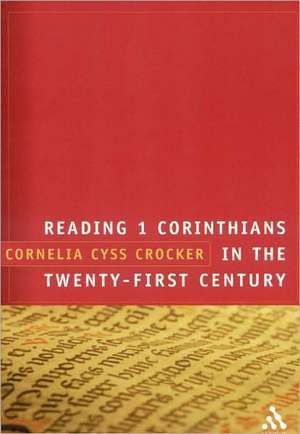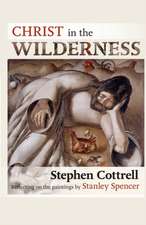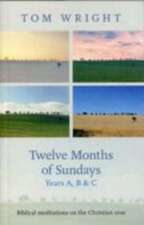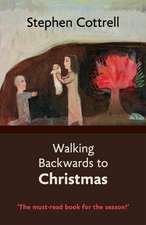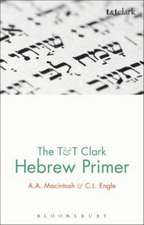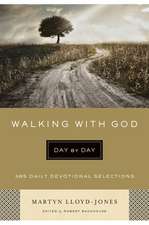Reading 1 Corinthians in the Twenty-First Century
Autor Dr. Cornelia Cyss Crockeren Limba Engleză Paperback – 31 iul 2004
Preț: 466.23 lei
Preț vechi: 645.54 lei
-28% Nou
Puncte Express: 699
Preț estimativ în valută:
89.21€ • 93.34$ • 74.11£
89.21€ • 93.34$ • 74.11£
Carte tipărită la comandă
Livrare economică 02-16 aprilie
Preluare comenzi: 021 569.72.76
Specificații
ISBN-13: 9780567026002
ISBN-10: 0567026000
Pagini: 264
Dimensiuni: 156 x 229 x 17 mm
Greutate: 0.43 kg
Editura: Bloomsbury Publishing
Colecția T&T Clark
Locul publicării:New York, United States
ISBN-10: 0567026000
Pagini: 264
Dimensiuni: 156 x 229 x 17 mm
Greutate: 0.43 kg
Editura: Bloomsbury Publishing
Colecția T&T Clark
Locul publicării:New York, United States
Recenzii
'This heavily footnoted study of the theology of 1 Corinthians uses M. Bakhin's dialogism to detect many voices whose echo can be perceived in 1 Corinthians.' Review in International Review of Biblical Studies, vol 51, 2004/05
"Cornelia Cyss draws together recent scholarship on aporia, Mikhail Bakhtin's literary theory, as well as in depth study of Pauline literature and scholarship to produce a truly profound thesis that can and will change how Paul is viewed. The key to her insightful reading is her refusal to engage in any kind of reductionist reading of Paul that seeks to establish a rigid consistency to Paul's own voice(s) or the 'voices' of his interlocutors. She does not hesistate to quarrel with Paul, but her eye is clearly focused on Paul's wrestling with concrete everyday issues of the church from a perspective that recognizes dialectical tensions irreducible one to the other or to some common synthesis. Her reading of Paul is a discovery of a model for 'discernment' in concrete situations that has an eye for new and healing possibilities rather than for censorship and condemmation."-Douglas R. McGaughey, Chair, Department of Religious Studies and Department of Classical Studies, Willamette University
Dr. Cyss' book is a mature and synthetically creative academic work that offers an analysis of the aporetic tensions that determine the Apostle Paul's eschatology, ecclesiology and ethics, particularly the seemingly contradictory pronouncements on judging and discerning. Especially original is her utilization of Mikhail Bakhtin's 'dialogism' to move beyond the limitations of rhetorical criticism in order to perceive the many voices that are discernible throughout the letter. This includes both the voices of the Corinthian Christians behind as well as in the letter, the voice of Paul himself, and also the voices of the scholars in front of the letter with whom she is dialoging as well as her own. This Ricoeurian perspective that she has adopted values historical-criticism and its related methodology, as well as literary-critical theories, but equally distinguishes that existential prospect of 'reading from this place,' and therefore engages in an interpretation of the biblical text that is theologically and spiritually oriented to the problems of life here and now."--Herman C. Waetjen, The Robert S. Dollar Emeritus Professor of New Testament of San Francisco Theological Seminary and the Graduate Theological Union.
"Crocker's study is congruent with current feminist attempts to move beyond reductionist approaches to Paul... should serve to change how Paul is viewed, to open up new possibilities for appropriating his message, and to stir debate about its implications for praxis."- Maria Pascuzzi, 68, 2006
'Crocker raises some valuable questions...[and contains] some noteworthy insights as well as a valuable summary of the historical-critical methods used for interpreting 1 Corinthians.' Themelios, Vol 31, Issue 2, January 2006
' Here is a critical, but not a final, reading, taking three exploratory trenches through the 'tell' that is this text. Would Paul recognize himself in this appeal for ecclesiastical transformation and equal opportunities? But he would welcome the opening up of his words of power to twenty-first-century readers.' ~ John M Court, Theology, Jan/Feb 2006
"Cornelia Cyss draws together recent scholarship on aporia, Mikhail Bakhtin's literary theory, as well as in depth study of Pauline literature and scholarship to produce a truly profound thesis that can and will change how Paul is viewed. The key to her insightful reading is her refusal to engage in any kind of reductionist reading of Paul that seeks to establish a rigid consistency to Paul's own voice(s) or the 'voices' of his interlocutors. She does not hesistate to quarrel with Paul, but her eye is clearly focused on Paul's wrestling with concrete everyday issues of the church from a perspective that recognizes dialectical tensions irreducible one to the other or to some common synthesis. Her reading of Paul is a discovery of a model for 'discernment' in concrete situations that has an eye for new and healing possibilities rather than for censorship and condemmation."-Douglas R. McGaughey, Chair, Department of Religious Studies and Department of Classical Studies, Willamette University
Dr. Cyss' book is a mature and synthetically creative academic work that offers an analysis of the aporetic tensions that determine the Apostle Paul's eschatology, ecclesiology and ethics, particularly the seemingly contradictory pronouncements on judging and discerning. Especially original is her utilization of Mikhail Bakhtin's 'dialogism' to move beyond the limitations of rhetorical criticism in order to perceive the many voices that are discernible throughout the letter. This includes both the voices of the Corinthian Christians behind as well as in the letter, the voice of Paul himself, and also the voices of the scholars in front of the letter with whom she is dialoging as well as her own. This Ricoeurian perspective that she has adopted values historical-criticism and its related methodology, as well as literary-critical theories, but equally distinguishes that existential prospect of 'reading from this place,' and therefore engages in an interpretation of the biblical text that is theologically and spiritually oriented to the problems of life here and now."--Herman C. Waetjen, The Robert S. Dollar Emeritus Professor of New Testament of San Francisco Theological Seminary and the Graduate Theological Union.
"Crocker's study is congruent with current feminist attempts to move beyond reductionist approaches to Paul... should serve to change how Paul is viewed, to open up new possibilities for appropriating his message, and to stir debate about its implications for praxis."- Maria Pascuzzi, 68, 2006
'Crocker raises some valuable questions...[and contains] some noteworthy insights as well as a valuable summary of the historical-critical methods used for interpreting 1 Corinthians.' Themelios, Vol 31, Issue 2, January 2006
' Here is a critical, but not a final, reading, taking three exploratory trenches through the 'tell' that is this text. Would Paul recognize himself in this appeal for ecclesiastical transformation and equal opportunities? But he would welcome the opening up of his words of power to twenty-first-century readers.' ~ John M Court, Theology, Jan/Feb 2006
